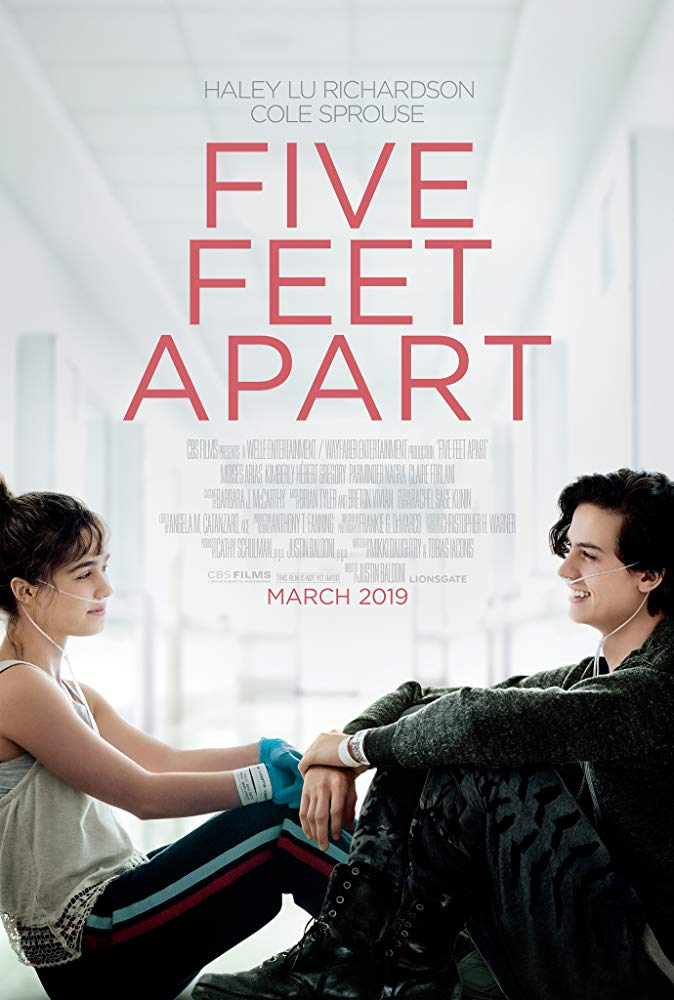“Five Feet Apart,” Justin Baldoni’s freshman directorial outing, follows the heartbreaking love story of two teenagers, both fighting a terrible disease that, tragically (in a vaguely Shakespearean way), links them together yet keeps them apart. Both teenagers suffer from cystic fibrosis, a brutal genetic disease that causes severe mucus build-up in the lungs and other organs. Due to the nature of the disease, and the wide variety of strains that a person genetically inclined for the disease can catch, people living with cystic fibrosis are required to maintain at least six foot buffer from others with cystic fibrosis at all times, so as to not spread their own infection or become infected with another strain of the bacteria (yes, the title says five feet, and to prevent any spoilers, let’s just say this discrepancy is explained in the film). While “Five Feet Apart” provides some shining moments and individual performances, it is unfortunate that the script falls short, preventing the film from becoming what could have been another “The Fault in Our Stars”-esque sensation of romance bound in illness.
 Hands down, the number one thing keeping this film afloat is an incredible performance by Haley Lu Richardson, who portrays the film’s protagonist, Stella. On a streak of roles consistently growing in complexity over the past few years, this is Richardson’s most poignant role to date. In this film, Richardson shows a beautifully broad range of emotions, keeping the audience enthralled in even the most cliché of moments. She is charming, and honest, and has proven that she is a force to be reckoned with in a driving role, one of the strongest players in the current line-up of young Hollywood.
Hands down, the number one thing keeping this film afloat is an incredible performance by Haley Lu Richardson, who portrays the film’s protagonist, Stella. On a streak of roles consistently growing in complexity over the past few years, this is Richardson’s most poignant role to date. In this film, Richardson shows a beautifully broad range of emotions, keeping the audience enthralled in even the most cliché of moments. She is charming, and honest, and has proven that she is a force to be reckoned with in a driving role, one of the strongest players in the current line-up of young Hollywood.
Cole Sprouse, playing Will, her opposite, brings with him some of the same brooding characteristics of his Jughead Jones character in the CW’s “Riverdale,” albeit much more grounded in reality. While it is probably his strongest role to date as well, his stand-offish, detached approach to the character, when paired with the amount of punch Richardson puts into every moment she is onscreen, makes his performance at times flat and one-note. Still, he manages a couple of powerful moments of his own, and the duo’s matching natural charisma plays well into their chemistry onscreen.
The film also boasts a strong supporting cast. Moisés Arias’ turn in the role of Poe is fun, and breathes some life into what could have easily been a relatively stock portrayal of the gay best friend. Another quiet standout is found in Kimberly Hebert Gregory as Nurse Barb, the teenagers’ caretaker and main source of support. Gregory brings with her an unconditional love dripping in emotional pain. She precariously rides the line between mother, friend and disciplinarian, and does so in such a quiet way (as many real life nurses do), that one may not even notice at first the serious amount of work she is putting into her performance.
While Justin Baldoni’s lengthy history as an actor clearly benefited his directorial decisions whilst working with his cast, his naivety in other aspects of the role shows. The visual style of the film was generally good, but it felt as if there were moments missed to visually express the distance that kept this young love apart. The pacing of the film at times dragged, and while some of the key dramatic moments were executed almost perfectly, others fell flat, leaving the audience missing something that just wasn’t there. With that said, for a first-time director, Baldoni showed serious promise with this piece, and proved he can be just as useful behind the camera as he can be in front.
Still, regardless of the caliber of the talent involved, a film can only be as good as its script, which is where this piece truly lacked. The film relies on far too many clichés to progress its story, and while the subject of the film is original, nothing else about it felt that way. The characters themselves are thin, especially in the supporting roles, and, were it not for the serious work of the actors in them, easily could have come across as mere stereotypes, each one cheaper and less substantiated than the next. The writers seemed to have sacrificed moments of true, necessary story progression for the sake of cheesy, nonsense moments, and somewhere in the middle, the plot becomes muddled. Stella’s sharp turn into falling in love feels unearned, as if somewhere, a crucial moment was cut for time. The most dynamic moments of the script fall to the scenes between Stella and Will, where the dialogue actually feels organic, and the actor’s chemistry fills the silence.
Despite its flaws, “Five Feet Apart” makes a necessary introduction for audiences to the terrible disease that is cystic fibrosis. And while it is an important topic to be discussed, it is also not an easy topic to formulate a plot around. It is rare to sit in an audience full of people, and feel (and at times hear) the room in equal parts crave for the two young lovers to finally come together, and yet beg them, for their own safety, not to. It is a tragedy with heart that only just misses its mark. Still, it is worth a viewing, if for Haley Lu Richardson’s performance alone.
Advertising disclosure: We may receive compensation for some of the links in our stories. Thank you for supporting Irvine Weekly and our advertisers.

